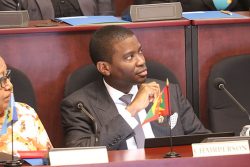While there is little doubt there are now clear signs of an emerging potentially lucrative oil and gas industry in Guyana, there exists, equally, a clear danger that the sector could pose what might well be the stiffest challenge yet to workers’ rights at a time when the focus among those entities, both local and foreign, involved in the sector will be maximizing their returns from the industry.
In a recent interview with the Stabroek Business, trade unionist Lincoln Lewis said that there are “absolutely no guarantees” that government is going to be able to stem the tide of what he described as “oil wealth mania………….” as businesses vigorously pursue profits at the expense of workers’ rights. That could be one of the bigger challenges to emerge from the dawn of the oil and gas economy, Lewis declared.
Employing his customary bluntness in addressing matters of national importance, Lewis told Stabroek Business that he was “definitely not comfortable” with the existing mechanisms that are in place “for a labour relations framework that will match the need for workers’ protection in the oil and gas era.” The GTUC General Secretary who is also General Secretary of the Guyana Bauxite and General Workers’ Union (GB&GWU) conceded that the advent of oil and gas had come at a time when the trade union movement “was far from at its strongest” and when our labour relations legal framework needed to be re-examined to determine how the system can be “significantly upgraded” to meet what he described as a “labour relations regime that meet the needs of an emerging oil and gas industry.”
“There is a lot that we can learn from our bitter experience with companies like RUSAL and BOSAI when, essentially, we signed on to agreements with these companies that lacked the necessary labour relations ‘backbone’ to keep them honest, so to speak. With RUSAL, particularly, the upshot of this has been that they have brutalized our workers, trampled on their rights and demonstrated total and utter contempt for the law of our country. The consequence has been one of national embarrassment,” Lewis told Stabroek Business.
And according to Lewis while there was an “understandable preoccupation” on the part of government in expediting agreements pertaining to “the production process and safeguarding the returns for Guyana,” there should exist “justifiable fears” that weak labour laws and fragile enforcement procedures could create a situation in which, “at the levels of both the local and foreign companies, our workers feel the sharp whip of abuse and exploitation.” Insisting that he was not seeking to be a “prophet of doom and gloom” Lewis told Stabroek Business that it would be naïve for Guyana to ignore the oil and gas “experiences” of Africa, where, he said, “the priorities of ‘big players,’ both local and foreign, have dashed the hopes of the poor in those countries that had come to see the advent of oil and gas as a way out of poverty. Frankly, one of my wishes for 2020 is that we have a government that sets its face firmly against corruption and the rich growing even richer, and focuses on addressing the legitimate expectations of the poor and the powerless.”
The veteran trade unionist told the Stabroek Business that another of his great concerns is with the environmental risks associated with the process. “One understands that the refining process is not being done here, but abroad. The point is, however, that there are risks that are associated with the recovery process and it is only natural that we wonder as to whether all of the requisite safeguards against oil spills and their consequences are in place. I worry about this particularly in the light of our own lack of reliable backup monitoring facilities. Frankly, I believe that now that the oil recovery process has begun in earnest, safety and health and environmental protection measures should become much more prominent on what one might call the national oil and gas agenda. In the same way that they are preoccupied with local content, I would wish to hear the private sector and the media, for that matter, talking much more about offshore protective and response mechanisms in the event that there is a mishap. We cannot, as sometimes appears to be the case, turn the oil and gas sector into a political debate, which is likely to be the case as general elections draw closer. I believe that this is a sufficiently big deal to cause this nation to put heads together since you get a funny feeling that if we fail here, that once for all opportunities that come to some countries will disappear, quite possibly forever,” Lewis says.






